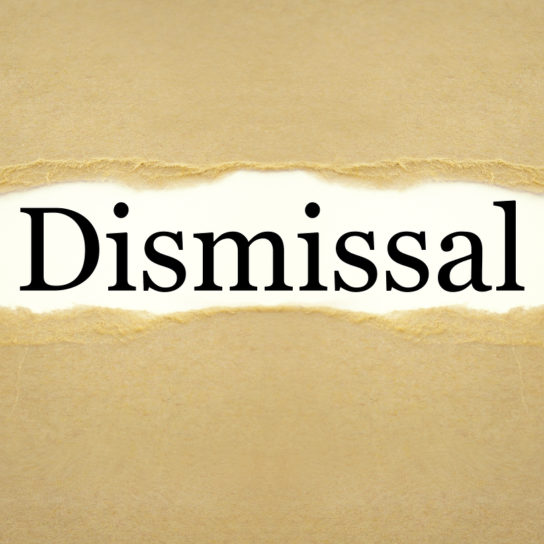On 8 April 2020, the Parliament passed legislation to give effect to the Government’s JobKeeper scheme and to amend the Fair Work Act 2009 (Cth) (FW Act) to give eligible employers greater flexibility to modify employees’ working hours, days, duties and location to minimise the impact of the COVID-19 pandemic on their business and seek to preserve jobs.
Category: Workplace Relations
Our latest news and insights
A collection of articles, case studies and media releases highlighting the latest in legal news and at Rigby Cooke Lawyers.

Best Lawyers success again for Rigby Cooke Partners
Rigby Cooke is pleased to announce that two of our Partners, Andrew Hudson and David McLaughlin have been included in the Best Lawyers in Australia rankings for 2021.

COVID-19 & JobKeeper – Latest Legislative and Award Changes
Last night, the Parliament passed legislation to give effect to the Government’s JobKeeper scheme and to amend the Fair Work Act 2009 (Cth) (FW Act) to give eligible employers greater flexibility to modify employees’ working hours, days, duties and location to minimise the impact of the COVID-19 pandemic on their business and seek to preserve jobs. The legislation became law after receiving Royal Assent today.
Coronavirus (COVID-19) FAQ’s for Employers
Current as at 1.00pm 9 April 2020
The Coronavirus (COVID-19) pandemic has raised a number of questions for employers. It is important to stay abreast of government regulation in this area as it will impact the decisions you make as a business and the currency and relevancy of our comments below.

ATO offers some flexibility under the Superannuation Guarantee Amnesty due to impact of COVID-19
Many employers seeking to take corrective action under the Superannuation Guarantee Amnesty (the Amnesty) may currently be so overwhelmed by the impacts of the COVID-19 pandemic that they do not consider they have the financial resources to apply for the Amnesty.

Fair Work Commission’s response to the COVID-19 pandemic
The COVID-19 pandemic and the restrictions implemented by both Federal and State Governments to combat the pandemic have had a substantial impact on businesses and their employees.

Flexibility schedule added to Clerks Private Sector Award
On Saturday 28 March 2020, the Fair Work Commission (FWC) full bench (presided by President Iain Ross, Deputy President Richard Clancy and Commissioner Michelle Bissett) granted a joint application made by the Ai Group and Australian Chamber of Commerce and Industry on 26 March 2020 to insert a COVID-19 flexibility schedule in the Clerks Private Sector Award (Award). The application was supported by the Australian Services Union and the Australian Council of Trade Unions.

COVID-19 flexibility schedule added to Hospitality Industry Award
Last night, the Fair Work Commission granted a joint Australian Hotels Association and United Workers Union application to insert a COVID-19 flexibility schedule in the Hospitality Industry (General) Award 2010 (Award), which will operate from 24 March 2020 until 30 June 2020, with a possible extension upon application.

Annualised wage arrangements
As part of the 4 yearly review of modern awards (which commenced in 2014 and is continuing), a Full Bench of the Fair Work Commission (FWC) has decided to replace and/or insert an
annualised wage clause in a number of awards.

Employer successfully appeals workplace defamation claim. Can an employer now say anything they want about an employee?
The news headlines often report on defamation claims filed by high profile celebrities and politicians.
However, a recent New South Wales decision concerning a child care worker and his ex-employer, a small private sector child care centre shows any Australian workplace is potentially at risk of a defamation claim.

The risks and consequences of new industrial manslaughter laws
With the recent introduction of the offence of workplace manslaughter in Victoria, it is important for organisations and their officers to understand the risks should they fail to maintain their health and safety obligations and how the consequences differ across the nation.

Recording workplace conversations
Is it lawful? Can it be done in secret? A recent case sheds light on how and when you can record workplace conversations.

Rigby Cooke Lawyers’ Workplace Relations expertise recognised
Rigby Cooke Lawyers’ Workplace Relations team continues to be recognised for their outstanding work in Employment Law and Workplace Health & Safety Law in Victoria.
The Legal Life – meet Sam Eichenbaum
Workplace Relations Partner Sam Eichenbaum has been named as one of Victoria’s leading employment lawyers in the Doyles Guide for five years in a row. Sam shares his career highlights and some thoughts for those just starting out in their legal career.
The Legal Life – meet David McLaughlin
Meet David McLaughlin, who leads Rigby Cooke’s Workplace Relations team.
David shares why he chose law and how he undwinds.

Labour Hire Licensing Scheme transition period ended on 30 October 2019: Large penalties for ‘providing’ or ‘using’ unlicensed labour hire.
The Labour Hire Licensing Act 2018 (Act) establishes a licensing scheme to regulate labour hire providers and labour hire users in Victoria.

Victorian Owner Drivers and Forestry Contractors Act passes Parliament
Amendments to the Owner Drivers and Forestry Contractors Act 2005 (ODFC Act) passed the Victorian Parliament on 12 September 2019, granting greater rights to contractors who own and drive their own vehicles.

Labour Hire Licensing Scheme starts 30 October 2019
Large penalties for ‘providing’ or ‘using’ unlicensed labour hire in the Transport industry
The Labour Hire Licensing Act 2018 (Act) establishes a licensing scheme to regulate labour hire providers and labour hire users in Victoria.

No records? The burden is on employers to disprove. Accurate employment records are crucial!
A recent Federal Court judgment demonstrates it is more crucial than ever that employers keep accurate records in accordance with the requirements in the Fair Work Act 2009 (Cth) (FWA) and Fair Work Regulations (Regulations).

Labour Hire Licensing Scheme starts 30 October 2019: Large penalties for ‘providing’ or ‘using’ unlicensed labour hire
The Labour Hire Licensing Act 2018 (Act) establishes a licensing scheme to regulate labour hire providers and labour hire users in Victoria.

Surveillance in the workplace
With the ever increasing responsibility on companies and their directors and officers to ensure safety and security in the workplace, as well as to ensure compliance with the Heavy Vehicle National Law (HVNL), various forms of workplace surveillance are increasingly being used by employers in the transport and logistics industry.

Biometric Fingerprinting and Unfair Dismissal
Safety v privacy: In a landmark decision, the Fair Work Commission (FWC) Full Bench has held that an employee was unfairly dismissed for refusing to use biometric scanners to sign in at work.

Interaction of the new whistleblower protections with the Fair Work Act 2009
The Fair Work Act 2009 (Cth) (FW Act) does not specifically deal with whistleblowers, and the Federal Government has previously rejected proposals to amend the FW Act to link disclosure rights under public and private sector whistleblowing laws with the General Protections in Part 3-1. That said, whistleblowers can still utilise provisions in the FW Act to gain additional protection, including where their disclosure may not actually qualify for protection under whistleblowing laws.

Employee misrepresentation – what can you do when an employee lies on their CV/job application?
The last few years have seen several high profile cases of senior executives being ‘caught out’ providing fake or misleading information on their CVs/ job applications.

Mental health issues in the workplace and the employer’s duty of care
What is the employer’s duty of care?
Employers have a duty under workplace health and safety legislation, including the Occupational Health & Safety Act (2004) (Vic), to provide and maintain (as far as is reasonably practicable) a safe workplace. In addition, employers have a duty to monitor the health of their employees. Criminal prosecution, penalties and potentially imprisonment can result if these statutory duties are breached.

Preparing for 1 July 2019 – Increases to wages and remuneration
20 June 2019 – Correction to article in footnote 5
Annual Wage Review Decision
On 30 May 2019, the Fair Work Commission handed down its 2019 Annual Wage Review Decision. The key elements of the decision are:

Labour Hire Licensing Scheme Commences in Victoria 2019
Last year the Victorian Government passed the Labour Hire Licensing Act 2018 (Act). The Act legislates a scheme to regulate labour hire providers and labour hire users in Victoria (Labour Hire Participants). The scheme legislated by the Act will commence operation on 29 April 2019 and labour hire providers are required to have applied for licences under the Act by no later than 29 October 2019.

Job Vacancy – Read Twitter!
The memory of the summer holidays are long over. And, as a full working year looms, some employees will consider looking for opportunities elsewhere.
There may be many motives to contemplate change. More pay or new career challenges, for example, a promotion. Or, the motive, as the common social media catchphrases go, might be that an employee leaves their boss, not the organisation – seeking neither money nor career advancement, but simply respect.

72 Year Old Employer Sentenced to Six Months’ Prison for Workplace Death
On 19 December 2018, the Latrobe Valley Magistrates’ Court sentenced a 72 year old employer to prison for breach of her duties to provide a safe workplace under the Victorian Occupational Health & Safety Act 2004 (OHS Act).

Putting an injured employee’s health and well-being first – a valid reason for dismissal?
The Fair Work Commission (FWC) has recently considered whether a dismissal for incapacity was harsh, unjust or unreasonable, in circumstances where the employee was unable to return safely to her substantive position and had declined to accept alternative employment due to her personal circumstances.

An incident happens at work – do you have to tell WorkSafe?
Following a health and safety related incident in the workplace, there are several actions that employers may need to take depending on the type of incident.

Termination of employment was not on the employer’s initiative
The Fair Work Commission (FWC) recently considered whether an employee’s employment was terminated on the employer’s initiative of whether the employee had resigned.

Fair Work Amendment (Casual Loading Offset) Regulations 2018
In response to the decision in WorkPac Pty Ltd v Skene [2018] FCAFC 131 (WorkPac Decision), the Minister for Jobs and Industrial Relations has made the Fair Work Amendment (Casual Loading Offset) Regulations 2018 (Cth) (Casual Loading Offset Regulations).

What is a “major change” triggering an obligation to consult?
It is often said that the one constant in life is change. Employers in the health and welfare industry are well aware of that fact of life, given the frequency of regulatory change. One of the consequences of those sorts of changes for employers is that they often result in the need to modify or reshape the skills or qualification mix or working hours of the workforce.

Human Resources responsibilities in implementing new Chain of Responsibility law
Changes to the Heavy Vehicle National Law (HVNL) took effect on 1 October 2018. These changes relate to new inclusions to Chain of Responsibility (CoR) laws, and resemble the current risk-based approach that is applied in workplace health and safety law.

Long service leave changes from 1 November 2018 – is your business ready?
On Thursday 1 November 2018, the Long Service Leave Act 2018 (Vic) (LSL Act 2018) took effect.
Although the rate at which long service leave (LSL) accrues (0.8667 weeks per year) will not change, there are other significant changes that businesses operating in Victoria need to ensure they comply with to avoid exposure to penalties which have tripled under the new law.

Flexible working arrangement requests
In September 2018, the Fair Work Commission (FWC) published a new model award term to supplement the flexible work provisions in s65 of the Fair Work Act 2009 (Cth) (FW Act). In another decision, when arbitrating a dispute under an enterprise agreement, it found that the employer had not demonstrated that it had “reasonable business grounds” for refusing an employee’s flexible work request.

Unfair dismissal – sustaining a valid reason
On 2 October 2018, a Full Bench of the Fair Work Commission, headed by Ross J, partially overturned a decision of Deputy President Colman, regarding the cases of Mr Gelagotis and Mr Hatwell which received media coverage because of the industrial context that the dismissals arose.

Managing mental health issues in the workplace: OH&S and anti-discrimination legislation tension
The prevalence of mental health issues and its impact on individuals and the workplace is now well-known and accepted by employers. Around 45% of Australians between 16-85 experience a mental health condition at some point in their lifetime[1]. In a given 12-month period, one in 5 Australians will have experienced a mental health condition[2].

Making an enterprise agreement – the procedural steps
The process of making an enterprise agreement and having it approved by the Fair Work Commission (Commission) is becoming ever more pedantically complicated.

Redundancy and acceptable alternative employment
A recent decision of the Fair Work Commission (FWC) provides insight into the meaning of “acceptable” alternative employment and when the FWC will use its discretion to reduce a redundancy payment in circumstances where an employee, whose position has become redundant, has declined an offer of alternative employment.

Casual Employees – important developments
In recent months there have been several important developments which affect businesses which employ casual employees directly or use casual labour hire workers.

New laws regulating provision and use of labour hire providers in Victoria
On 26 June 2018 the Labour Hire Licensing Act 2018 (Act) was assented to after it passed the Victorian Parliament on 20 June 2018. The Act legislates a scheme to regulate labour hire providers and labour hire users in Victoria (Labour Hire Participants).

Family and domestic violence leave – a new Award entitlement
Every four years the Fair Work Commission (FWC) reviews the Modern Awards that apply to a significant portion of Australia’s workforce. In 2017, the ACTU made a submission to the FWC as part of that process proposing that Family and Domestic Violence leave (FDV leave) be included in the Awards. Research indicates that family or domestic violence had a negative impact on their work for nearly 60% of women experiencing family or domestic violence.

Modern slavery and the Australian workplace
This article was updated on 29 August 2018 and provides an update to our previous coverage on this matter.
Slavery is thought of as something from a past era. However, legislators across the world have passed laws this decade to combat modern slavery, for example, in 2010 California passed the Transparency in Supply Chains Act. In 2015, the UK followed with the Modern Slavery Act.

Personal leave – how many hours in a day?
The National Employment Standards (NES) in the Fair Work Act provide that employees are entitled to accrue 10 days of personal leave per 12 months of continuous service. Where employees regularly work a standard 7.6 hour day in a 76 hour fortnight, this is not problematic. However, problems can arise where an employee works a non-standard or varying work pattern.

How a Modern Slavery Bill would affect Australian exporters
The Modern Slavery Bill was promoted to prompt businesses to consider how they do business on a global scale, including within their supply chain, and take steps to eradicate any risk of modern slavery.

Termination of employment for inability to perform inherent requirements of an employee’s position
The Fair Work Commission (FWC) recently considered whether a dismissal for incapacity was “harsh, unjust or unreasonable” in the following decisions.

Mitigating circumstances for misconduct results in employee’s reinstatement
This is the story of a worker who sent an offensive text message to his co-workers, and the legal battle that ensued. The key message… context is key.

“You will HATE working here.” What can an employer do about a negative online review?
This quote is taken from an online platform dedicated to employees expressing their anonymous opinions about their employers.

Independent Contractors or Employees? An important distinction
Transport companies often have people working for them, or providing services to them, in a number of different capacities.

Independent Contractors or Employees? An important distinction
Transport companies often have people working for them, or providing services to them, in a number of different capacities. In addition to full-time, part-time and casual employees, transport companies may engage drivers or other workers who are described as independent contractors and who may rely exclusively on the transport company for work and income and be subject to significant control of their activities by the transport company.

Schedule of minimum wage increases – transport sector
The following tables detail the new minimum rates of pay for part-time and full-time employees under various modern awards, applicable to employees in the transport industry.

Implementing demotions effectively
Demotion of an employee may arise when there is a change in the operational requirements of a role or as a disciplinary consequence following an employee’s unsatisfactory performance or conduct.

The dangers of taking a ‘casual’ approach to employment status
Incorrectly assuming that an employee is a casual, rather than a full time or part time employee can be a very costly mistake, as a recent Federal Circuit Court decision has again highlighted.

Change in approach for fixed term contract unfair dismissal claims
An employee’s contract reaches its expiry date and the employment ends. Can the employee claim that they were unfairly dismissed?

Important changes to the Real Estate Industry Award – is your agency compliant?
On 2 April 2018 significant changes to the Real Estate Industry Award 2010 (Real Estate Award) made by the Fair Work Commission (FWC) came into effect.

Can an employer say ‘no’ to a support person?
Employees might assert they have a ‘right’ to have a support person present during certain processes, for example during performance management, investigations and disciplinary procedures.
Understanding the role of a support person, and how far an employer can go to control what they can do, is an important element of successfully and lawfully managing employees.

Return to work obligations
Managing the relationship with your WorkCover Agent and the Return to Work Inspector.
Whether you operate in an office or a warehouse, workplace injuries can happen to any business!
If an accident happens, as an employer, you must understand the obligation for returning an injured employee to work, in circumstances, where a WorkCover claim has been accepted. The Victorian WorkCover Authority (VCA) has a central role in overseeing this process.

The risks in ending an employment contract by repudiation
A Supreme Court order which saw a financial services firm pay $423,445 to a former accountant provides a reminder of how repudiation of employment contracts can be used by employees to obtain significant damages awards and prevent employers from enforcing otherwise valid post-employment restraints.

Human Resources responsibilities in implementing new Chain of Responsibility law
Changes to the Heavy Vehicle National Law (HVNL) are due to take effect in mid-2018. These changes relate to new inclusions to Chain of Responsibility (CoR) laws, and resemble the current risk-based approach that is applied in workplace health and safety law.

Rigby Cooke Lawyers workplace relations proficiency recognised
Rigby Cooke Lawyers’ Workplace Relations team continues our strong presence in the market, with the expertise of partners Sam Eichenbaum and Rob Jackson recognised by independent survey and review source Doyle’s Guide, in their 2018 Employment (Employer Representation) and Workplace Health & Safety lists.

Dealing with post-work Christmas party fallout
The festive season is upon us, with many companies having hosted their end of year celebrations over recent weeks. Although most parties go off without a hitch, sometimes there can be post-event fallout which needs to be addressed.

How poorly executed performance improvement plans can impact the dismissal process
When an employee is struggling with meeting company expectations, often a performance improvement plan (PIP) is implemented as an opportunity for the employee to rectify unsatisfactory performance and/or problematic behaviours. Unfortunately this process is not always successful, and in some cases a disciplinary process will commence and dismissal may result.

Greater franchisor and holding company liability comes into effect to protect vulnerable workers
Franchisors and holding companies will now face much greater accountability for failing to act when a franchisee or subsidiary is found to be breaching the Fair Work Act (FWA).

Employee, independent contractor or volunteer? A crucial distinction for Not-for-Profits
Not-for-profit organisations often have people working for them in a number of different capacities. In addition to employees, there could be independent contractors or volunteers.

Penalty rates for Sunday and public holidays to be cut
On Thursday 23 February 2017, the Full Bench of the Fair Work Commission (FWC) delivered its long awaited decision on penalty rates as part of its four yearly review of modern awards.

Abandonment of Employment clause ineffective
A recent decision of a Full Bench of the Fair Work Commission (FWC) has examined the operation of the Abandonment of Employment clause in the Manufacturing (etc) Award (Bienias v Iplex Pipelines Australia Pty Ltd [2017] FWCFB 38).

Hiring Overseas Employees?
| Myth: It is only an employee’s responsibility to have the correct visa to work in Australia.
Truth: An employer also has an obligation to check the migration status of an employee. |

Employees leaving – IT forensic accountant and confidentiality
Prudent business owners will go to great lengths to protect their intellectual property and confidential information from their employees and competitors.

Notice of termination and leave – can they run concurrently?
There is a range of scenarios in which the interaction between notice of termination and leave can arise and, unhelpfully for employers, neither the Fair Work Act 2009 (Cth) (FW Act) nor the Long Service Leave Act 1992 (Vic) (LSL Act) specifically address these issues.

Modern award changes in Transport & Logistics
Cashing out annual leave, excessive annual leave and annual leave in advance.
The Fair Work Commission (FWC) has reviewed annual leave in modern awards and there have been changes to the annual leave provisions to the transport industry modern awards to1 :

Caravan park owners: know your Awards
Avoid underpayment claims: This year’s award wage increases explained
Award rates and the national minimum wage increased by 2.4% from the first full pay period on or after 1 July 2016. Award allowances were also increased.

Trucking company ordered to pay
In a sobering lesson for trucking companies, the Industrial Relations Court of South Australia has ordered Atkins Freight Services Pty Ltd (Atkins Freight), an Adelaide transport company, to pay penalties of $93,000 and back-pay more than $374,000 to 10 truck drivers.

Preparing for 1 July – Wages and Remuneration
On 31 May 2016, the Fair Work Commission handed down its 2016 Annual Wage Review Decision.

Your Employment is Terminated
A recent decision of the Supreme Court of NSW1 has provided a timely reminder of the importance of ensuring the existence and currency of employment contracts.


